SSCORRE!
Saint Sophia Cathedral
Online Resources for our Religious Edification

Topic of the Week – A Lenten Challenge
“Do you want to do something radical for the Lord Jesus… something that will seriously change your life?
Of course, you signed up for that when you became a Christian. The Christian life is by definition radical and it is by definition a lifelong quest to change our lives from loving ourselves to loving God.
The Lenten challenge I would like to present you… came from one of the most precious prayers that we pray during the holy days of Lent. It’s called the Prayer of Saint Ephraim the Syrian. We pray it constantly in Lent during the weekdays; Vespers, Compline, Orthros services. It goes like this:
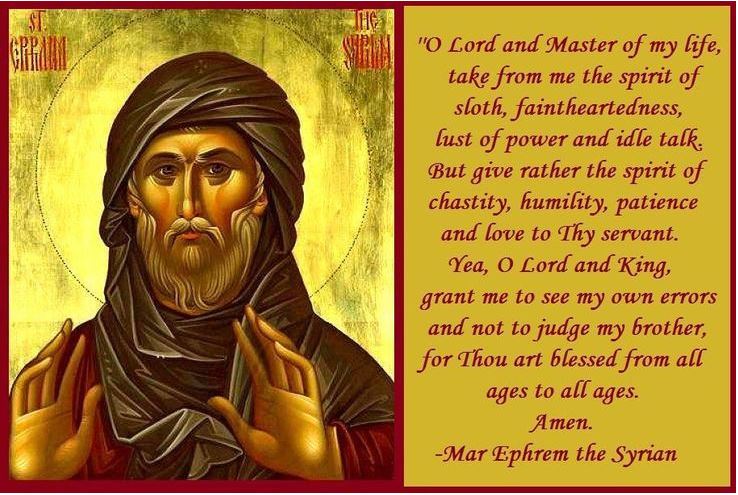
Those 3 petitions – we make a full prostration with our head to the ground after each one and that’s followed by making the sign of the cross and saying God have mercy on me a sinner, repeating the full prayer and then a prostration at the end…
Think of some of the themes shared in these petitions: take from me sloth, faintheartedness, meddling, idle talk, give me the spirit of chastity, humility, patience and love… grant that I might see my own sins and not to judge my brother…
This theme of maintaining our spiritual focus on our own hearts and using Lent as a quest to see ourselves truly, to be able to see our reflection in the spiritual mirror, so to speak. This is the theme of this prayer. In order to do that, it’s impossible to be looking at other people’s sins. Inasmuch as we look at other people’s sins, we are unable to look at our own sins.
So, here’s the challenge, and it is radical and it is lifechanging, and it is exceedingly difficult. The challenge is… to go through all of the days of Lent without even a single time speaking about the sins of someone else, let alone judging. To go through the entire time of Lent refusing to speak of anyone else’s sin, and if you do, to repent of it immediately, get back up and get back at it. This is the quest, the challenge… it is proving to be in our lives exceedingly difficult which means it is exceedingly important.
May God be our helper and may his grace prevail over our sins….”
Listen to the entire challenge here: Can You Accept My Lenten Challenge?
Adult/Family:
“…This prayer penetrates the heart like none other, mysteriously acts upon it, and you feel a special, exceptional divine power in it… It is short, but it nevertheless contains an enormous wealth of thoughts and feelings. Extraordinarily important is the very fact that St. Ephraim asks God to deliver him from everything unholy and repugnant to Him, and to vouchsafe him great virtues. Why does he ask for this?
There are people… who rely entirely upon themselves and think that everything is achievable through the powers of their minds and feelings. They do not understand that many things, in fact the most important, precious and cherished things, are not accessible to our minds and feelings. Whoever understands this understands what the apostle Paul said: For that which I do I allow not: for what I would, that do I not; but what I hate, that do I (Rom. 7:15). …He pined and suffered because he did not do the good that his soul desired, but did the evil that he did not want.
Deeply aware of this, St. Ephraim the Syrian prayed to God that He would deliver him from wickedness, that He would give him the strength to do good. The strength to do good works, like the strength to be freed from vices, is something we receive only from God. The soul of every Christian is vaguely aware of this, and that is why the prayer of St. Ephraim the Syrian so touches it.
Every man has his own spirit—in his soul are the traces left by those vices in which he sins, as well as by the good that he does. It is much easier to be freed from individual vices than from the spirit of these vices. The latter is possible only gradually, with God’s help.
We have to uproot this habit, and not allow it to grow in us; we have to catch ourselves at every judgment. After stopping ourselves once or twice, we will learn to refrain from judging others and stop it, having focused our spiritual gaze on our own hearts.
Excerpted from An Explanation of the Prayer of St. Ephraim the Syrian by St. Luke, Archbishop of Simferopol and Crimea
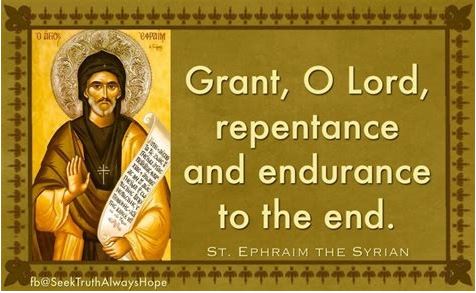
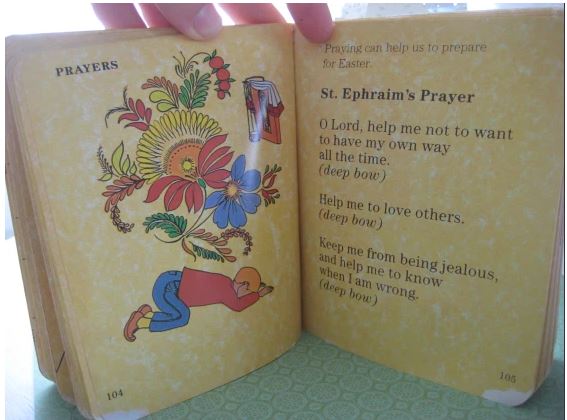
Elementary School:
Read this lesson on Forgiveness and Repentance and watch this video to learn how to pray the Prayer of St Ephrem, with prostrations and bows demonstrated
All of our confession resources are here.

Middle School:
Learn how to pray the Prayer of St Ephrem, with prostrations and bows demonstrated
“Every day of Great Lent, with the exception of Saturdays and Sundays, the prayer “O Lord and Master of my life” is read. According to tradition, this prayer was written in Syria in the fourth century by the ascetic Mar Afrem or, as we have grown accustomed to calling him, Ephraim the Syrian….”
Read The Meaning of the Prayer of St. Ephraim the Syrian to learn the essence of this prayer read daily with prostrations during Great Lent.
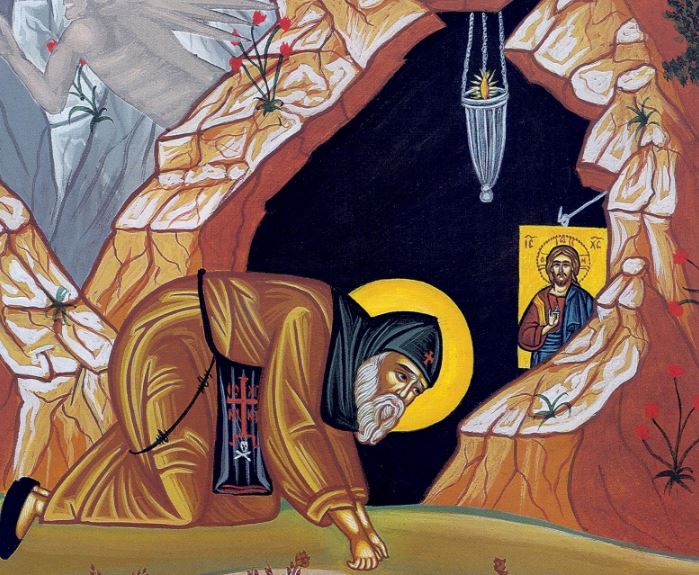
High School:
A Spiritual Checklist
“Orthodox Christians recite a prayer during Great Lent that is described by Fr. Alexander Schmemann as a “check list” for our spiritual lives. This prayer, given by St. Ephraim the Syrian in the fourth century, is commonly called the “Lenten Prayer:…”
Fr. Alexander explains that the prayer – along with the spiritual disciplines of Great Lent (as well as the rest of the year) – is “aimed first at our liberation from some fundamental spiritual diseases which shape our life and make it virtually impossible for us even to start turning ourselves to God.”
Let’s go through the prayer of St. Ephraim to see how it can help order your spiritual life….”
Read The Lenten Prayer of Saint Ephraim explained to find out how. Learn how to pray the Prayer of St Ephrem, with prostrations and bows demonstrated.
A Message from Maria Spanos
I am passionate about our Orthodox Christian faith and seek to help others learn as much as they can about it. My purpose here is to share online resources that help strengthen our relationship with Christ and bind us closer to His Church. I believe they are invaluable in learning about our precious Orthodox Tradition, and are a great aid for teaching family members, friends and others about Orthodoxy. ~Maria
Two of my favorite quotes:
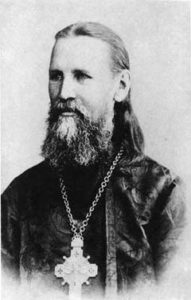 “A true Christian behaves in this life so that it may be a preparation for the future one and not only a life here below. In his actions, he does not think what will be said of him here but of what will be said there in heaven; he represents to himself that he is always in the presence of God, of the angels and all the saints, and remembers that someday they will bear witness of his thoughts, words, and deeds.” — Saint John of Kronstadt
“A true Christian behaves in this life so that it may be a preparation for the future one and not only a life here below. In his actions, he does not think what will be said of him here but of what will be said there in heaven; he represents to himself that he is always in the presence of God, of the angels and all the saints, and remembers that someday they will bear witness of his thoughts, words, and deeds.” — Saint John of Kronstadt
__________________________________________________________

“Of all the holy works, the education of children is the most holy.”
— St. Theophan the Recluse






